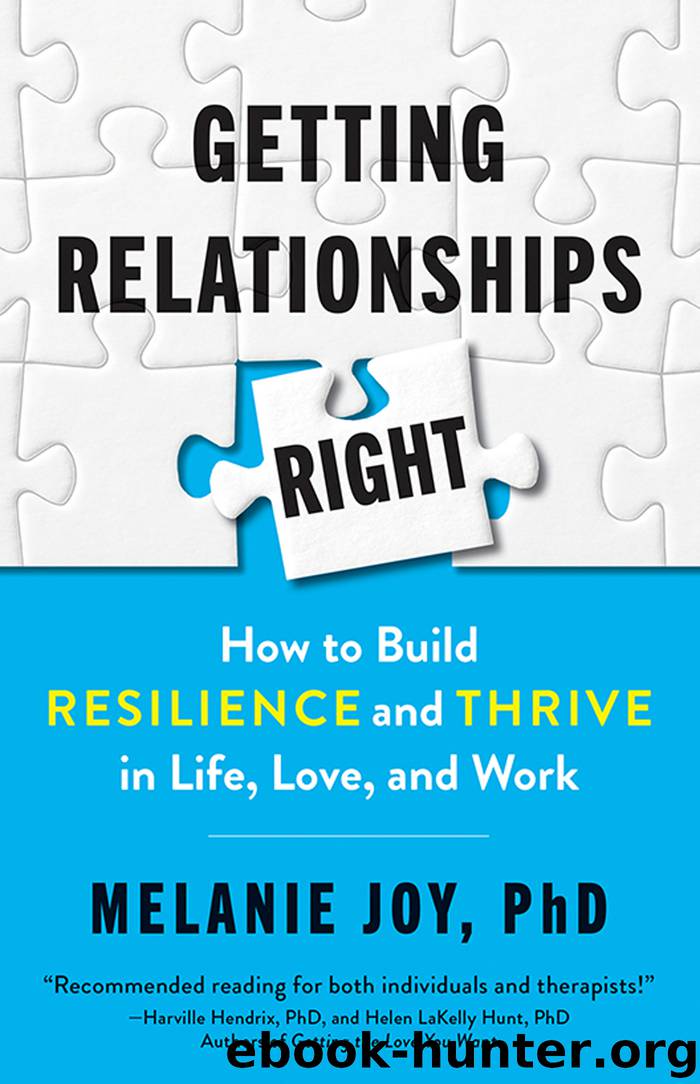Getting Relationships Right by Melanie Joy

Author:Melanie Joy
Language: eng
Format: epub
Publisher: Berrett-Koehler Publishers
Published: 2019-03-12T16:00:00+00:00
Value Differences and Respect
It’s difficult, if not impossible, to feel secure and connected with someone if we don’t feel respect for them. However, when we have different values—especially different moral values—we can struggle to feel respect for the other, because we tend to respect others to the extent that they practice the values that matter to us. For example, if you value honesty, you will probably have a hard time feeling respect for your neighbors whom you see as dishonest.
Just as we tend to equate difference with deficiency, we tend to equate value differences with value deficiencies—we judge others’ values as inferior to our own. And because of the moral nature of values, the judgment we feel toward another’s value “deficiencies” tends to be even stronger, and therefore more disconnecting, than the judgment we feel toward other types of differences. We tend to see the other as less moral, or even immoral, and can struggle to feel respect for them.
It can feel worrisome to think that value differences mean that it won’t be possible to maintain respect for someone we care about. Indeed, research shows that respect is vital to relationship resilience. For example, in lab settings, married couples who exhibited contempt—the strongest form of disrespect—were more likely to end up divorced.9 And one of the main reasons people begin affairs is that they don’t feel admiration, the strongest form of respect, from their partners.10
So how can you maintain respect in the face of value differences? First, it helps to understand what, precisely, respect is. Respect is the behavior of treating others as you would want to be treated; it is essentially practicing integrity toward them. Respect is also a feeling, which is based on a belief. When you believe that someone is worthy of respect, you believe that they have inherent worth, dignity, and are not morally inferior to yourself or anyone else. You may not agree with their behaviors—you may judge their behaviors as problematic and choose not to remain in the relationship because of how they act—but you don’t see them as less worthy than you are. You appreciate that everyone is neither more nor less than the biology they were born with and all their moment-to-moment life experiences, and you don’t expect them to be different from who or how they are. In this sense, when you struggle to feel respect for another, it is often an indication that you are not as connected with your empathy for them as you could be. It is difficult, if not impossible, to feel disrespect for another if we truly empathize with them.
Sometimes, however, a value difference may nevertheless make it too difficult for you to feel respect for the other. If someone is truly acting against values you hold dear, you may have to decide whether to continue the relationship, change its category, or end it. We’ll discuss managing such a seeming impasse in chapter 9. But regardless of whether you are able to feel respect, you can still act with respect.
Download
This site does not store any files on its server. We only index and link to content provided by other sites. Please contact the content providers to delete copyright contents if any and email us, we'll remove relevant links or contents immediately.
Should I Stay or Should I Go? by Ramani Durvasula(7660)
The Lost Art of Listening by Michael P. Nichols(7498)
The Rosie Project by Graeme Simsion(6386)
Beartown by Fredrik Backman(5742)
We Need to Talk by Celeste Headlee(5609)
Ego Is the Enemy by Ryan Holiday(5422)
Hunger by Roxane Gay(4923)
Suicide Notes by Michael Thomas Ford(4824)
I Love You But I Don't Trust You by Mira Kirshenbaum(3869)
Mummy Knew by Lisa James(3686)
Not a Diet Book by James Smith(3413)
Crazy Is My Superpower by A.J. Mendez Brooks(3398)
Toxic Parents by Susan Forward(3285)
Girl, Wash Your Face by Rachel Hollis(3282)
The Complete Idiot's Guide to Coping With Difficult People by Arlene Uhl(3145)
The Social Psychology of Inequality by Unknown(3023)
Name Book, The: Over 10,000 Names--Their Meanings, Origins, and Spiritual Significance by Astoria Dorothy(2986)
The Hard Questions by Susan Piver(2967)
The Gaslight Effect by Dr. Robin Stern(2791)
